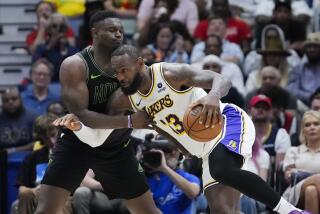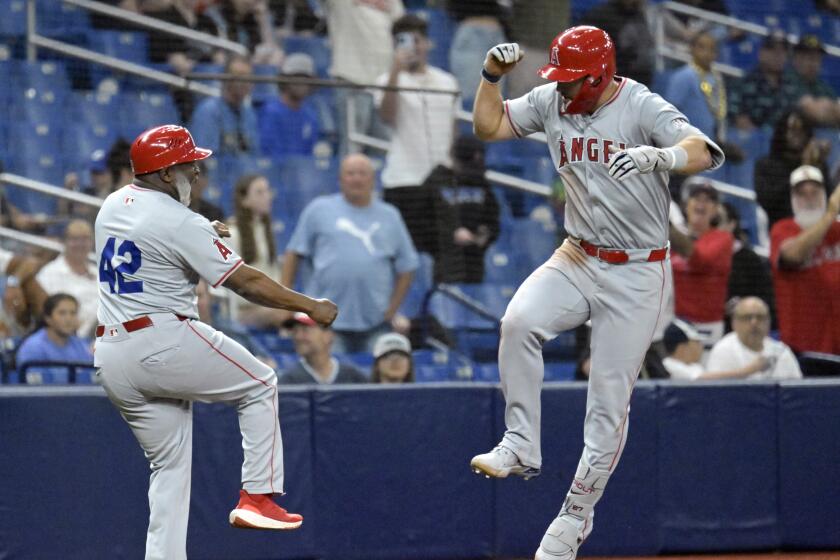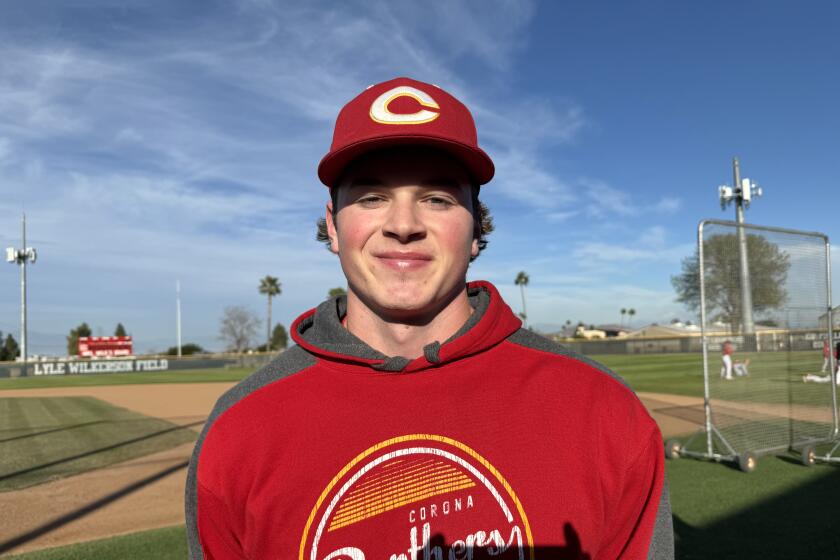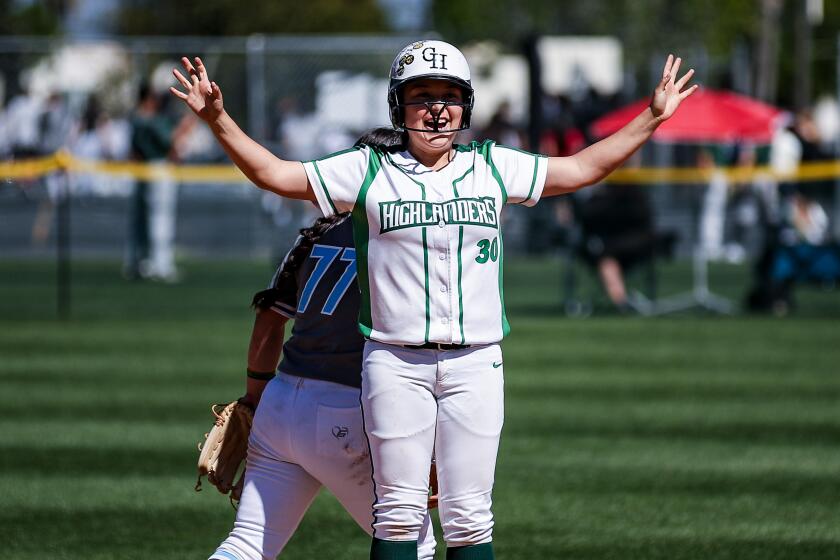Curt Gowdy, 86; Versatile Broadcaster Helped Televised Sports Come of Age
Curt Gowdy, the neighborly broadcaster whose voice was the soundtrack of World Series games, Super Bowls, NCAA Final Fours and Rose Bowls as televised sports came of age, has died. He was 86.
Gowdy died Monday at his winter home in Palm Beach, Fla., after a long battle with leukemia, said a spokesman for the Boston Red Sox, his employer before his career with NBC.
Dodger broadcaster Vin Scully called Gowdy “one of the great broadcasters in the history of sports,” and other colleagues praised his versatility in announcing almost every major sporting event.
“His powerful Wyoming voice was one of the greatest, and no one will ever again do all the events he did,” said CBS broadcaster Dick Enberg, who considered Gowdy a mentor. “He was a beautiful man and great influence. The last of the dinosaurs.”
Gowdy was the play-by-play man for NBC’s World Series broadcasts for 10 consecutive years in the 1960s and ‘70s, and did seven Super Bowls for the network, including Super Bowl I in 1967.
“When you heard Curt Gowdy call a game, you knew it was a big game,” said Dick Ebersol, chairman of NBC Sports. “Curt was a remarkable talent. For many years, he literally carried NBC Sports on his back as the signature voice for both Major League Baseball and the NFL.”
Gowdy’s versatility extended to the Olympics and its varied sports. An avid hunter and fisherman, he also hosted the ABC outdoors show “The American Sportsman.”
Born July 31, 1919, in Green River, Wyo., Gowdy played basketball at the University of Wyoming and got his start in radio in 1944 when he stood on a crate to call a six-man high school football game between Pine Bluff and St. Mary’s.
By 1951, he had landed a job as the announcer for the Red Sox, where he stayed for 15 seasons, his distinct voice becoming what Major League Baseball Commissioner Bud Selig called “a comfort to a generation of baseball fans in New England.”
Bob Murphy, one of Gowdy’s partners in the Red Sox booth and later a New York Mets broadcaster, told the New York Times before his death in 2004 that his mentor simply suggested, “Let’s announce like we’re friends, just talking to each other.”
In 1960, Gowdy made the now-famous call of Ted Williams’ final at-bat:
“Everybody quiet now here at Fenway Park after they gave him a standing ovation of two minutes knowing that this is probably his last time at bat. One out, nobody on, last of the eighth inning. Jack Fisher into his windup, here’s the pitch. Williams swings and there’s a long drive to deep right! The ball is going and it is gone! A home run for Ted Williams in his last time at bat in the major leagues!”
After joining NBC, Gowdy became closely linked with the American Football League, the upstart league that eventually pressured the NFL into a merger.
He once said the New York Jets’ upset of the Baltimore Colts in Super Bowl III was the greatest event he witnessed in sports.
“It wasn’t the best game I ever broadcast or the most exciting, but it was a historic game,” Gowdy said in an interview with the American Sportscasters Assn.
“That changed the thinking of America about the AFL,” he said. “Suddenly everyone started to say they were as good as the NFL, which from top to bottom they weren’t. But that really changed the outlook of pro football and was probably the greatest upset of all time.”
Al Davis, owner of the Oakland Raiders and the former commissioner of the AFL, called Gowdy “one of the great ones” and said his popularity helped propel the new league.
“He brought us into fame and notoriety,” Davis said. “We gave him great games, and boy, did he bring them across as great games.
“His style was something Middle America could take as their own, and the big cities could take as their own.... Everyone liked him, and everyone liked the AFL.”
The friendships Gowdy made persisted. Williams remained a hunting buddy for many years, as did Alabama football Coach Paul “Bear” Bryant.
In 1975, when college basketball analyst Billy Packer was preparing to work his first NCAA Final Four tournament, Gowdy offered him a ride to the arena for the title game between UCLA and Kentucky, John Wooden’s final game as UCLA coach.
“He said, ‘Well, kid, I’ll meet you in the lobby and we’ll ride over with a friend of mine.’ It was Al Davis,” Packer said. “There was no one in the sports world Curt Gowdy didn’t know and have a genuine relationship with,” Packer said.
In 1970, Gowdy became the first sportscaster to be honored with the George Foster Peabody Award for excellence in broadcasting for his “blend of reporting, accuracy, knowledge, good humor, infectious honesty and enthusiasm.”
He has been honored by the National Baseball Hall of Fame with its Ford C. Frick Award and by the Pro Football Hall of Fame with its Pete Rozelle Award. The Naismith Memorial Basketball Hall of Fame named its media award after Gowdy, the organization’s former president and first recipient of the award.
“Whether it was the World Series or Super Bowl or a major college ball game or the Olympics, he was the man,” Packer said. “He was always polite to people. There was no ego whatsoever. He never demanded anything when he traveled. It wasn’t about limousines, suites, no makeup.
“It was just about the game.”
Gowdy is survived by his wife, Jerre; two sons, Curt Jr., a sports television executive in New York, and Trevor; a daughter, Cheryl Ann, and five grandchildren.
*
Times staff writer Steve Henson contributed to this report.
More to Read
Get our high school sports newsletter
Prep Rally is devoted to the SoCal high school sports experience, bringing you scores, stories and a behind-the-scenes look at what makes prep sports so popular.
You may occasionally receive promotional content from the Los Angeles Times.






